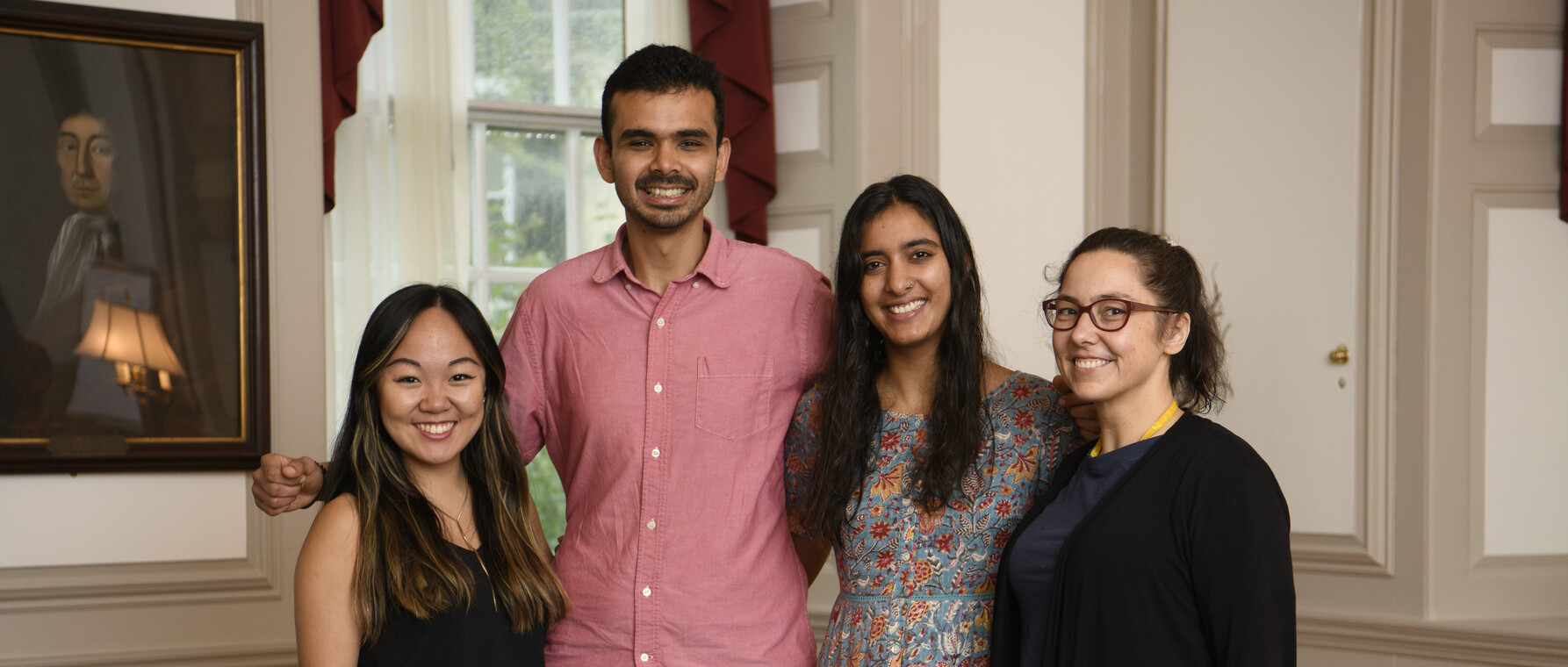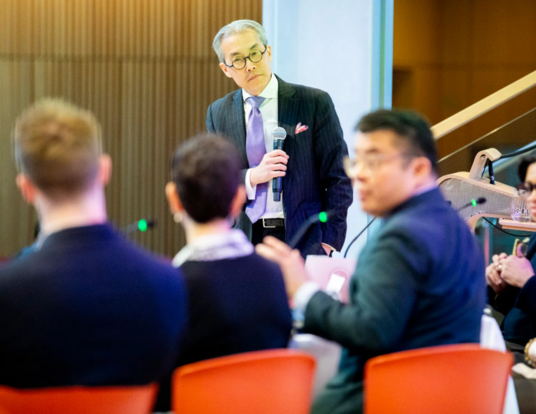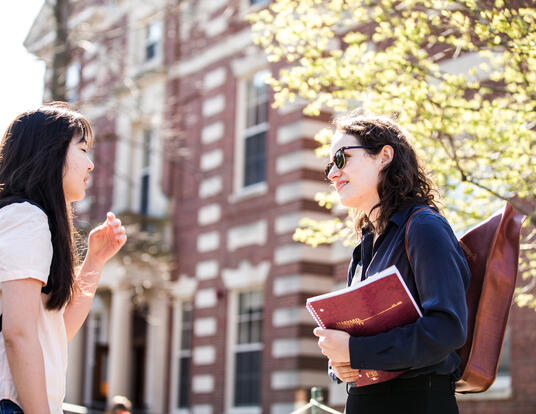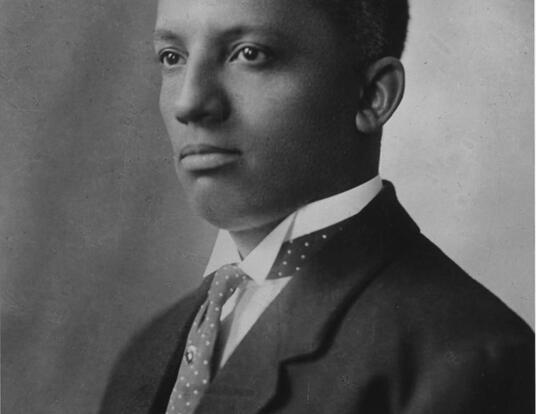No Imposters
Yash Rana works to help students feel like they belong in the Harvard Griffin GSAS residence halls

Students at the Harvard Kenneth C. Griffin Graduate School of Arts and Sciences (GSAS) often wrestle with imposter syndrome—that anxious feeling that someone from the School’s Office of Admissions may tap them on the shoulder and say, “Sorry, we made a mistake. We meant to give your spot to someone far more brilliant, accomplished, and deserving.” For most, it’s a profoundly isolating experience. For Yash Rana, a resident advisor (RA) in Perkins Hall, it was a chance to bring people together and build community.
“I and Rebecca McDonald-Balfour, another RA, organized an imposter syndrome party,” he says. “We wrote all these affirmations and laid them out on the tables in the lounge. People came, had some food, and sat together. As they picked up the affirmations, you could see them start to relax and feel at home with each other. I felt proud to be a resident advisor because I could help people feel that they belonged here.”
Helping students feel that they belong—along with fostering the astonishing diversity of the Harvard Griffin GSAS residential community—is why Yash Rana decided to become an RA. Like his colleagues throughout the residence halls, Rana helps create a friendly and supportive environment, especially for those who, like him, come from a different country and culture.
Welcome Home
Now in his second year as an RA, Rana knows what it feels like to be an outsider. He grew up in India, where he got his undergraduate and master’s degrees in physics from the Indian Institute of Science Education & Research, Mohali. After graduation, though, he moved to Germany for a stint as a researcher at the Max Planck Institute of Molecular Cell Biology and Genetics. Then, in 2020 he came to the United States to pursue his PhD at Harvard. Here, he works at the intersection of physics and biology on research that may provide insight into mammalian development and age-related infertility.
When he arrived at Harvard, Rana had to adjust to yet another new culture, climate, and academic environment. At the Harvard Griffin GSAS residence halls, he found others who shared the experience of being new to the University—and the US.
“When I got there, immediately, I felt a sense of belonging,” he says. “It’s primarily international students, all of us just trying to do good work. And there’s so much mutual respect for each other. I could just go there and be myself. I was welcomed, and that made it feel like home to me.”

Rana’s on-campus home, Perkins Hall, is one of four residence halls at Harvard Griffin GSAS. Built in the 1890s along with Conant Hall, Perkins was joined in 1950 by Richards and Child halls, both of which were designed by renowned architect Walter Gropius. The halls can house more than 400 residents, mostly Harvard Griffin GSAS students, although a small group from other graduate schools at the University live there as well. And, like Rana, most come from somewhere other than the US. “This year, about 65 percent of the students in the residence halls are from countries other than the US,” says Director of Residential Life Ashley Skipwith.
Today, Rana counts among his friends students from Brazil, Puerto Rico, the United Kingdom, Germany, Russia, Kazakhstan, Nigeria, Egypt, Mongolia, India, Singapore, Australia, and many other countries. “There is no one majority,” he says. “It’s a mix of Americans, Latinos, people from different ethnic backgrounds, and various religions.”
Fostering that diversity is one reason why Rana decided to become an RA. “The inclusiveness that comes to mind when people think of Harvard really exists in the residence halls where we’re all physically located in the same place,” he explains. “When I came here, I had never talked to people who had studied history or politics or education. I just fell in love with the intellectual richness. And so, when I had a chance to help strengthen it, I thought being an RA is something that I would like to do.”
The inclusiveness that comes to mind when people think of Harvard really exists in the residence halls where we’re all physically located in the same place.
—Yash Rana
Rewarding and Enriching
As an RA, Rana gets a room and up to 10 meals a week at the GSAS Commons. He also gains valuable leadership, administrative, and interpersonal skills. Skipwith says RAs not only build community but also are a primary resource for the residents on the floor to which they are assigned.
“A large part of an RA’s role is community building: putting on programs, social events, and ways for residents to connect,” she says. “But they are also liaisons between residents and the managers of the facilities. They deal with emergencies, refer students to counseling and mental health resources, and of course, connect with us here at the Office of Residential Life.”
Being an RA requires Rana to balance his research and academic obligations with his responsibilities to the students in his hall. It also requires him to be available to residents—whether by email, phone, or in person—and to be creative and resourceful in organizing activities that keep people connected. But Rana says the work is also rewarding and deeply enriching. He’s learned a lot from his fellow RAs who are as motivated and passionate about building community as he is. He’s also learned a lot from residents studying sciences other than physics or fields like history, education, and culture. The new perspectives have made him a better thinker and researcher.
“I was discussing my scientific research with someone who was studying public policy,” he says. “They made me realize that science, which I thought was unbiased, is context-dependent on geopolitical conditions. Another time, a romance languages student told me that my project’s description sounded as aesthetic as a painting by Kandinsky. This made me appreciate the beauty of my research alongside its scientific aspects. These conversations have expanded my horizons and helped me see my work from different angles.”
Being an RA isn’t all deep thoughts and serious responsibilities. Rana treasures his time just hanging out with his fellow residents in Perkins’ third-floor lounge. “Every evening last year, a bunch of us would gather to cook, chat, or just sit together. That sense of shared space was so comforting. Then, as finals week approached, my fellow resident advisor and I organized a birthday celebration. Despite the stress, people came together in the lounge and we had a blast. It was a way to relax and enjoy each other’s company during a challenging time.”
Yash Rana had his own struggles with imposter syndrome, but he overcame them, thanks in large part to the community he found—and now helps create—at the Harvard Griffin GSAS residence halls. Today, when he sees a student struggling, he passes on the words of Daryl Ziegler, his advisor at the Harvard International Office.
“You can make a mistake in choosing Harvard, but Harvard never makes a mistake in choosing you,” he says. “There really are no imposters. You belong here.”
Join the resident advisor team! Apply on Slideroom to be a 2024–2025 RA by February 1.
Get the Latest Updates
Join Our Newsletter
Subscribe to Colloquy Podcast
Simplecast





